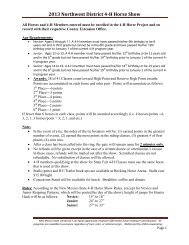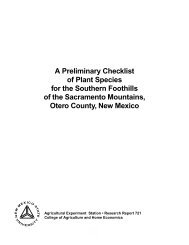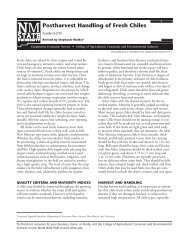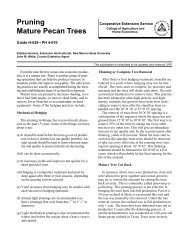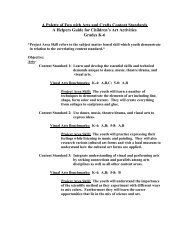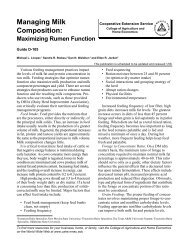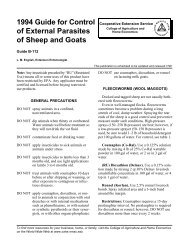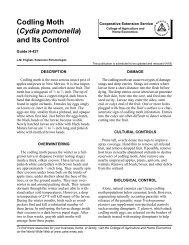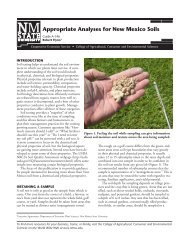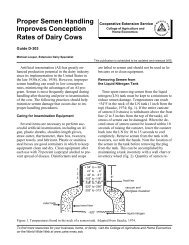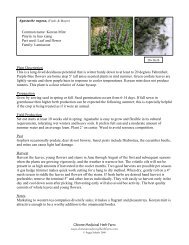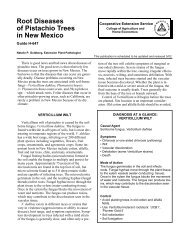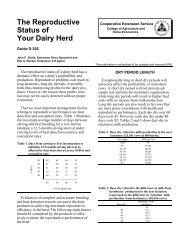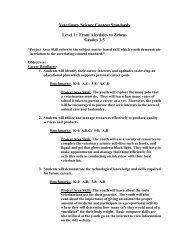Farm Resource Management (FRM) - College of Agricultural ...
Farm Resource Management (FRM) - College of Agricultural ...
Farm Resource Management (FRM) - College of Agricultural ...
You also want an ePaper? Increase the reach of your titles
YUMPU automatically turns print PDFs into web optimized ePapers that Google loves.
AWATT <strong>Farm</strong> <strong>Resource</strong> <strong>Management</strong> Training ManualRATIONALE FOR PROJECTContinued use <strong>of</strong> short-term wheat-rice crop rotations in Afghanistan may not be sustainable.As a consequence, farmers need viable production alternatives. If there are more options forfarmers, there is a better probability that agricultural and community systems can remain viableand sustainable.However, before farmers can make objective decisions about alternative, sustainableagricultural practices, they need sound information from replicated, long-term research anddemonstration conducted at a realistic farm-size in different districts in Nangarhar Province inAfghanistan.The <strong>Farm</strong> <strong>Resource</strong> <strong>Management</strong> (<strong>FRM</strong>) project's principal investigator is Dr. Hamdy SolimanOushy, Associate Pr<strong>of</strong>essor at the New Mexico State University and the Forage & Rangeland<strong>Management</strong> Specialist at the USAID-Funded AWATT Program in Afghanistan. It is hiscontention that although the rice/wheat crop rotations may have been pr<strong>of</strong>itable in the past,they have had negative consequences like reducing organic matter in the soil and increasing soilerosion, increasing the need for more external inputs like fertilizer and pesticide.Integrated crop rotation using Egyptian clover may be a good alternative for farmers. Usingextended pasture rotations with livestock also diversifies the farming system and reducesreliance on fertilizer, pesticide and fossil fuels.DESCRIPTION OF PROJECTA selected section <strong>of</strong> farmland at Nangarhar Province in Afghanistan will be used in a uniquemulti-disciplinary applied study involving USDA/ADT/DAIL/AWATT research scientists, DAILextension agents and Nangarhar stakeholders.A farming system consisting <strong>of</strong> Egyptian clover rotations with livestock integrated intoconservation-based row crop production will be established. Teams will measure and comparevarious agroecological attributes associated with this system. Costs and revenues will beanalyzed as well as how this type <strong>of</strong> agricultural system would affect soil fertility, weed anddisease control, and the local farming communities within and around Nangarhar Province.The <strong>FRM</strong> field experiment will be similar to a small demonstration project at the Behsood,Kama, Chaparhar, Shishem Bagh, and Khewa Districts‘ farms involving Egyptian cloverintegrated into a wheat/rice cropping system. The system is being attempted because it hasalready shown great potential in Egypt, Pakistan and India.This new project will encompass a much larger area than the demonstration project and consist<strong>of</strong> three types <strong>of</strong> land management:Extended rotations <strong>of</strong> wheat/Egyptian clover;Extended rotations <strong>of</strong> corn, cotton, pearl millet, Sudan grass/Egyptian clover;Permanent forage <strong>of</strong> alfalfa in extended rotations;Afghanistan Water, Agriculture and Technology Transfer Program 5



